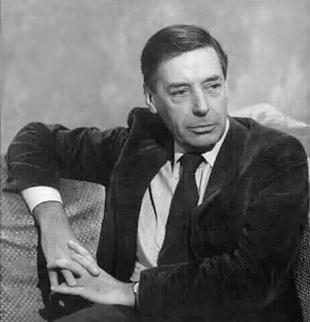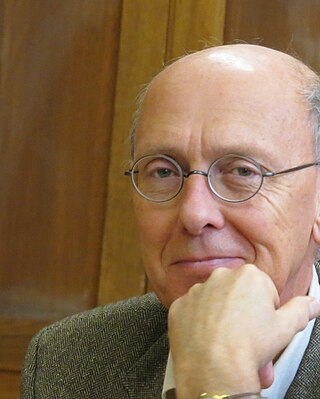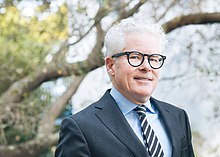
Philosophy of law is a branch of philosophy that examines the nature of law and law's relationship to other systems of norms, especially ethics and political philosophy. It asks questions like "What is law?", "What are the criteria for legal validity?", and "What is the relationship between law and morality?" Philosophy of law and jurisprudence are often used interchangeably, though jurisprudence sometimes encompasses forms of reasoning that fit into economics or sociology.
David Gauthier is a Canadian-American philosopher best known for his neo-Hobbesian social contract (contractarian) theory of morality, as developed in his 1986 book Morals by Agreement.
Action theory is an area in philosophy concerned with theories about the processes causing willful human bodily movements of a more or less complex kind. This area of thought involves epistemology, ethics, metaphysics, jurisprudence, and philosophy of mind, and has attracted the strong interest of philosophers ever since Aristotle's Nicomachean Ethics. With the advent of psychology and later neuroscience, many theories of action are now subject to empirical testing.

Thomas Nagel is an American philosopher. He is the University Professor of Philosophy and Law Emeritus at New York University, where he taught from 1980 to 2016. His main areas of philosophical interest are legal philosophy, political philosophy, and ethics.

Christine Marion Korsgaard, is an American philosopher who is the Arthur Kingsley Porter Professor of Philosophy Emerita at Harvard University. Her main scholarly interests are in moral philosophy and its history; the relation of issues in moral philosophy to issues in metaphysics, the philosophy of mind, and the theory of personal identity; the theory of personal relationships; and in normativity in general.

Sir Bernard Arthur Owen Williams, FBA was an English moral philosopher. His publications include Problems of the Self (1973), Ethics and the Limits of Philosophy (1985), Shame and Necessity (1993), and Truth and Truthfulness (2002). He was knighted in 1999.
In ethics, value pluralism is the idea that there are several values which may be equally correct and fundamental, and yet in conflict with each other. In addition, value-pluralism postulates that in many cases, such incompatible values may be incommensurable, in the sense that there is no objective ordering of them in terms of importance. Value pluralism is opposed to value monism.
Michael Andrew Smith is an Australian philosopher who teaches at Princeton University. He taught previously at the University of Oxford, Monash University, and was a member of the Philosophy Program at the Research School of Social Sciences, Australian National University. He is the author of a number of important books and articles in moral philosophy. In 2013, he was elected a Fellow of the American Academy of Arts and Sciences.

Joseph Raz was an Israeli legal, moral and political philosopher. He was an advocate of legal positivism and is known for his conception of perfectionist liberalism. Raz spent most of his career as a professor of philosophy of law at Balliol College, Oxford, and was latterly a part-time professor of law at Columbia University Law School and a part-time professor at King's College London. He received the Tang Prize in Rule of Law in 2018.

Thomas Michael "Tim" Scanlon, usually cited as T. M. Scanlon, is an American philosopher. At the time of his retirement in 2016, he was the Alford Professor of Natural Religion, Moral Philosophy, and Civil Polity in Harvard University's Department of Philosophy, where he had taught since 1984. He was elected to the American Philosophical Society in 2018.

Jonathan Peter Dancy is a British philosopher, who has written on ethics and epistemology. He is currently Professor of Philosophy at University of Texas at Austin and Research Professor at the University of Reading. He taught previously for many years at the University of Keele.
In the most general terms, a reason is a consideration which justifies or explains an action, a belief, an attitude, or a fact.

Geoffrey Sayre-McCord is an American philosopher who works in moral theory, ethics, meta-ethics, the history of ethics and epistemology. He teaches at the University of North Carolina, Chapel Hill. He is also the director of the Philosophy, Politics and Economics Society.
The Tanner Lectures on Human Values is a multi-university lecture series in the humanities, founded in 1978, at Clare Hall, Cambridge University, by the American scholar Obert Clark Tanner. In founding the lecture, he defined their purpose as follows:
I hope these lectures will contribute to the intellectual and moral life of mankind. I see them simply as a search for a better understanding of human behavior and human values. This understanding may be pursued for its own intrinsic worth, but it may also eventually have practical consequences for the quality of personal and social life.
The demandingness objection is a common argument raised against utilitarianism and other consequentialist ethical theories. The consequentialist requirement that we maximize the good impartially seems to this objection to require us to perform acts that we would normally consider optional.
The British Society for Ethical Theory is a philosophical organisation dedicated to philosophical research in normative ethics, meta-ethics, and moral psychology. The society holds an annual conference; and facilitates the exchange of information, drafts of papers, and reviews among its members.
Roger Stephen Crisp is fellow and tutor in philosophy at St. Anne's College, Oxford. He holds the university posts of Professor of Moral Philosophy and Uehiro Fellow and Tutor in Philosophy. His work falls principally within the field of ethics, in particular metaethics, normative ethics, and applied ethics. In addition, he is chairman of the Management Committee of the Oxford Uehiro Centre for Practical Ethics.

Pragmatic ethics is a theory of normative philosophical ethics and meta-ethics. Ethical pragmatists such as John Dewey believe that some societies have progressed morally in much the way they have attained progress in science. Scientists can pursue inquiry into the truth of a hypothesis and accept the hypothesis, in the sense that they act as though the hypothesis were true; nonetheless, they think that future generations can advance science, and thus future generations can refine or replace their accepted hypotheses. Similarly, ethical pragmatists think that norms, principles, and moral criteria are likely to be improved as a result of inquiry.
Ethics is, in general terms, the study of right and wrong. It can look descriptively at moral behaviour and judgements; it can give practical advice, or it can analyse and theorise about the nature of morality and ethics.
Samuel Ira Scheffler is a moral and political philosopher, who is University Professor of Philosophy and Law in the Department of Philosophy and the School of Law at New York University.









